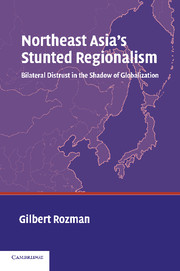Book contents
- Frontmatter
- Contents
- Acknowledgments
- Map
- Northeast Asia's Stunted Regionalism
- 1 Introduction: The Challenge of the Northeast Asia Region
- 2 Exiting the 1980s: Cold War Logic and National Aspirations
- 3 1991–1993: Border Fever and Cross-Border Duplicity
- 4 1994–1996: Civilizational Bridges and Historical Distrust
- 5 1997–1998: Strategic Partnerships and National Rivalries
- 6 1999–2000: Sunshine Policy and Security Dilemmas
- 7 2001–2003: Unilateralism and Irrepressible Regionalism
- 8 Conclusion: Lessons for Constructing Regionalism in Northeast Asia
- Index
6 - 1999–2000: Sunshine Policy and Security Dilemmas
Published online by Cambridge University Press: 18 December 2009
- Frontmatter
- Contents
- Acknowledgments
- Map
- Northeast Asia's Stunted Regionalism
- 1 Introduction: The Challenge of the Northeast Asia Region
- 2 Exiting the 1980s: Cold War Logic and National Aspirations
- 3 1991–1993: Border Fever and Cross-Border Duplicity
- 4 1994–1996: Civilizational Bridges and Historical Distrust
- 5 1997–1998: Strategic Partnerships and National Rivalries
- 6 1999–2000: Sunshine Policy and Security Dilemmas
- 7 2001–2003: Unilateralism and Irrepressible Regionalism
- 8 Conclusion: Lessons for Constructing Regionalism in Northeast Asia
- Index
Summary
Globalization swept forward as the U.S. economy reached the apex of its boom and the successful conclusion of the war over Yugoslavia confirmed the unlimited reach of U.S. military force. The futile objections of China and Russia during the war period demonstrated that great-power differences no longer could exercise a restraining force. United States triumphalism reached its peak. No rival challenged the military dominance of the world's lone superpower, and only isolationist states such as North Korea resisted its economic penetration. Cultural diffusion also intensified, to the alarm of national elites as well as the various losers in globalization. A backlash was building that found only two outlets: 1) terrorism to use destructive force surreptitiously so that retaliation would be difficult; and 2) regionalism to pool multiple national resources in order to find balance against one or another form of U.S. hegemony. Regionalism in NEA found new life both as a by-product of increased economic interaction and as expression of a desire to balance the overwhelming power of the United States. Given the ambivalence of nationalist elements, each country was tempted to take a shortcut to make regionalism appear unthreatening.
In 1999 and 2000 the United States was preoccupied with first the war in Yugoslavia, then the political struggle over Clinton's personal life, and finally a nail-biting presidential election. Apart from a late burst of talks with North Korea, it was satisfied with a holding operation in NEA, even as other countries explored new cooperation.
- Type
- Chapter
- Information
- Northeast Asia's Stunted RegionalismBilateral Distrust in the Shadow of Globalization, pp. 228 - 287Publisher: Cambridge University PressPrint publication year: 2004



